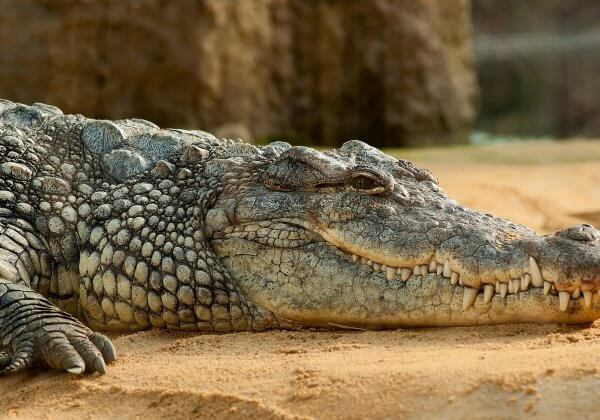Australian Crocodile Farm Footage Sparks International Protests
A week after the horrific cruelty of the crocodile skins industry in Australia was exposed on national television, PETA France activists protested outside the Hermès flagship store in Paris.
Wearing crocodile masks and green bikinis, activists held bag-shaped signs – which implored the designer to “Arrêtez la Torture” (“Stop the Torture”) and called it out as an “Accessoire de Meurtre” (“Accessory to Murder”).
 Mathilde Mazars
Mathilde Mazars
The Paris protest was quickly followed by actions in London and New York.
View this post on Instagram
Cruelty to Crocodiles
New eyewitness footage supplied to Kindness Project by Farm Transparency Project reveals that crocodiles are subjected to horrendous cruelty on Australian skin farms. The video documents the practices of four farms in the Northern Territory – Australia’s largest crocodile-skin producer – all with links to fashion brand Hermès.
Thousands of crocodiles are confined to barren concrete pens, with little more room than the length of their body to move around in.
When they’re 2 or 3 years old – just a fraction of their natural life expectancy – they’re electrocuted and dragged from their pens while their bodies convulse. Workers then shoot them in the top of their heads with a captive-bolt gun and sever their spines with a knife. A screwdriver is then shoved into the incision wound, intended to scramble the crocodile’s brain. Some crocodiles were observed moving around for over a minute after this had been done to them.
At least three crocodiles endure this suffering to make just one Hermès crocodile-skin bag.
PETA and our international affiliates have exposed cruelty at reptile farms in Texas, Zimbabwe, and Vietnam, and the story is always the same: grim, close confinement and a violent death.

An image from a PETA exposé of the crocodile skin trade in Vietnam.
Exotic Skins and Zoonotic Diseases
Because crocodiles who are raised on farms for their skin are kept crowded together in highly unhygienic conditions – sometimes one on top of another in pits of putrid water – conservation experts warn that the next pandemic could come from the fashion industry.
Much like the “wet market” where the COVID-19 pandemic originated, crocodile farms create a breeding ground for many zoonotic pathogens, including salmonella, vibrio, Aeromonas spp, Pseudomonas spp, E coli, trichinella, and West Nile virus – all of which crocodilians have been found to carry and can pass on to humans.
 Mathilde Mazars
Mathilde Mazars


Hermès Plans Australia’s Largest Crocodile Farm
There’s nothing stylish about cramming sensitive animals into pits, hacking them apart, and leaving them to die – yet fashion companies like Hermès continue to expand crocodile-farming operations in Australia.
The latest proposed development would imprison up to 50,000 saltwater crocodiles in the Northern Territory.
This comes at a time when exotic skins are falling out of fashion. Chanel, Tommy Hilfiger, Calvin Klein, Mulberry, HUGO BOSS, and Victoria Beckham have all banned crocodile and other exotic skins from their collections.
Hermès should invest in humane, sustainable, and future-proof projects, not build new factory farms to torment animals and create a breeding ground for new pandemics. Join us in urging the brand to shed exotic skins now:







